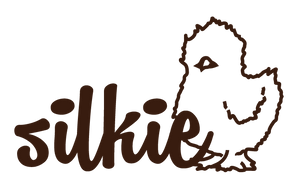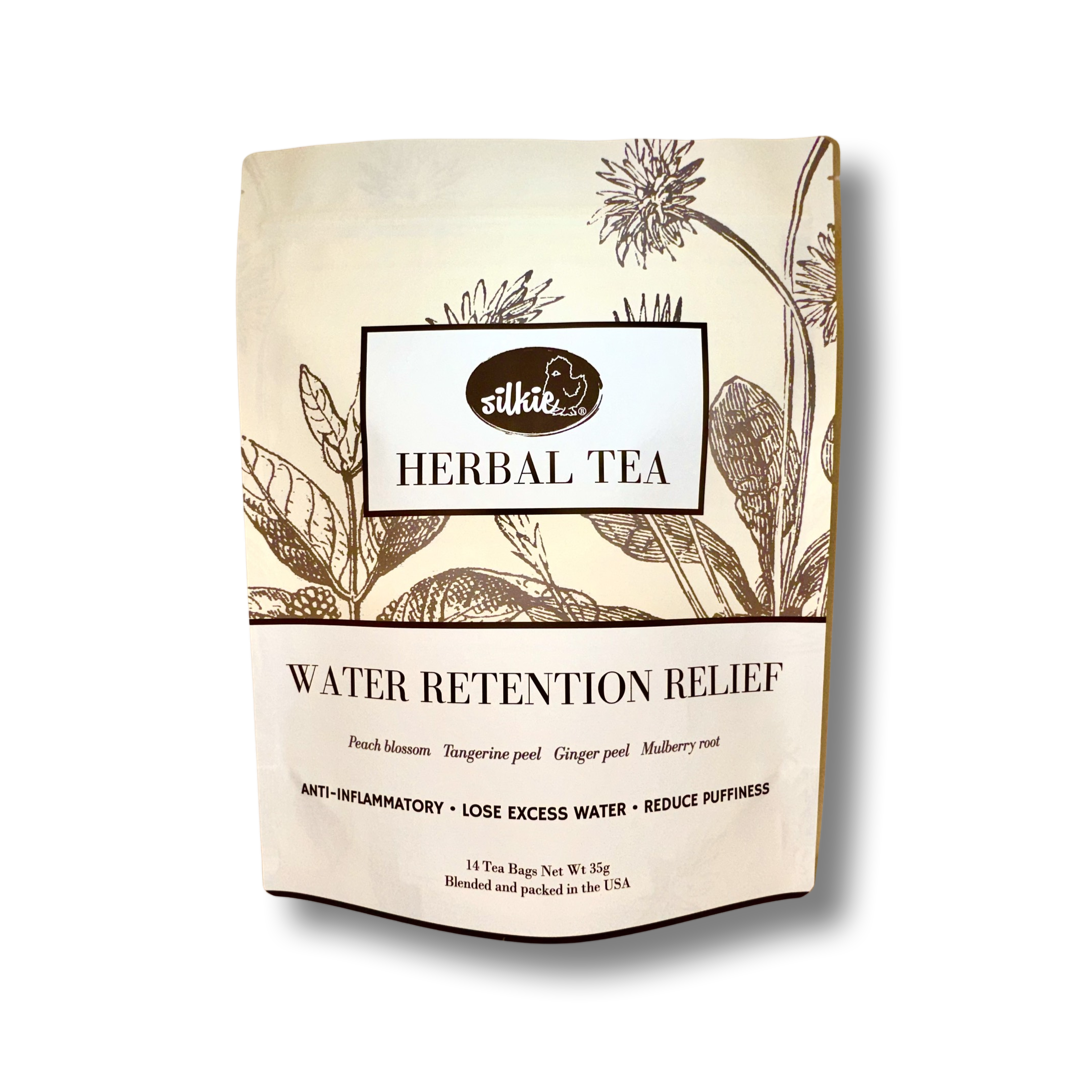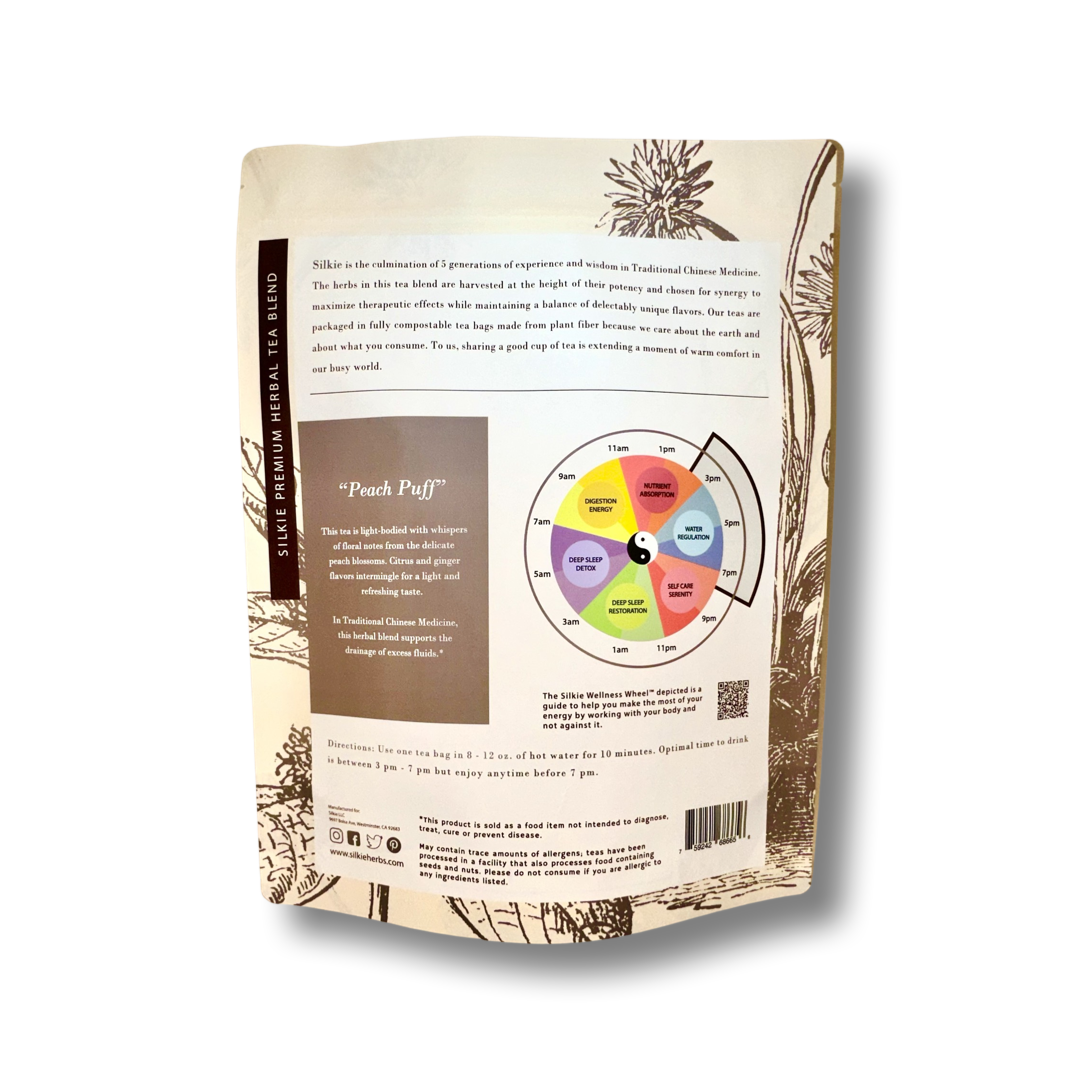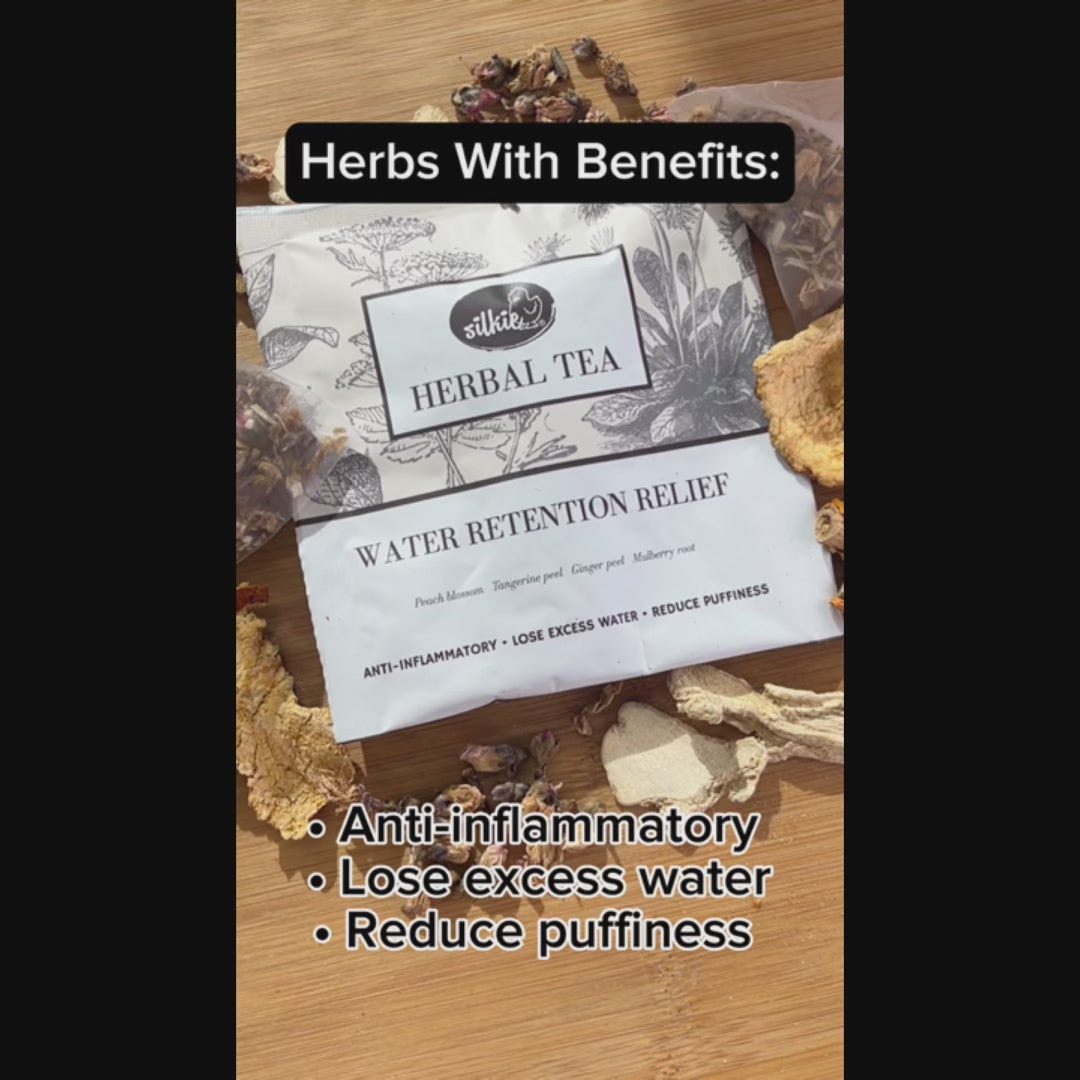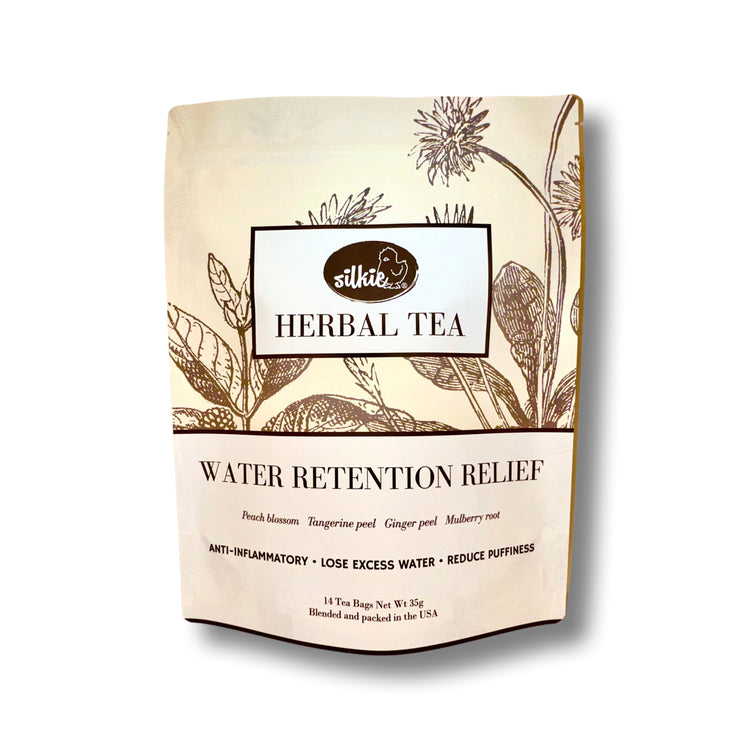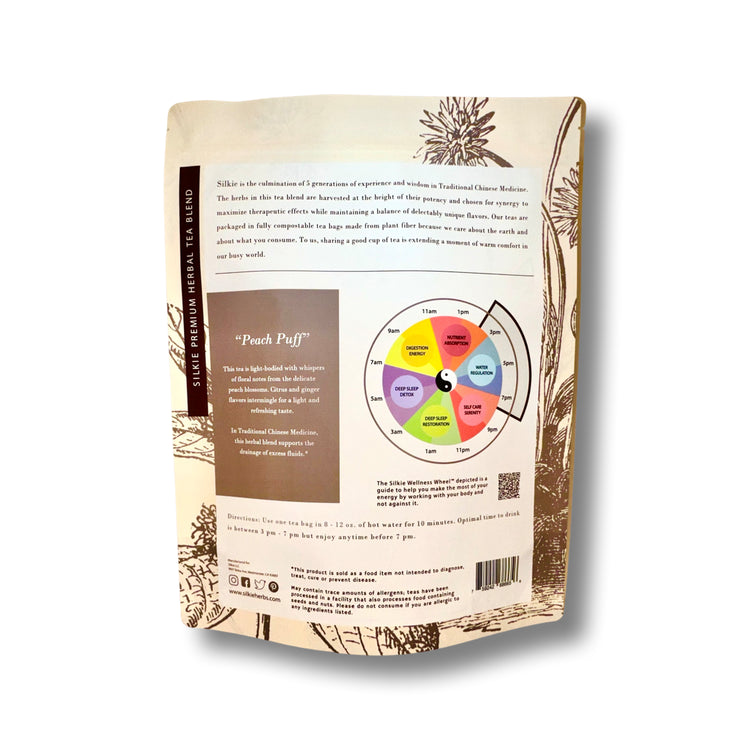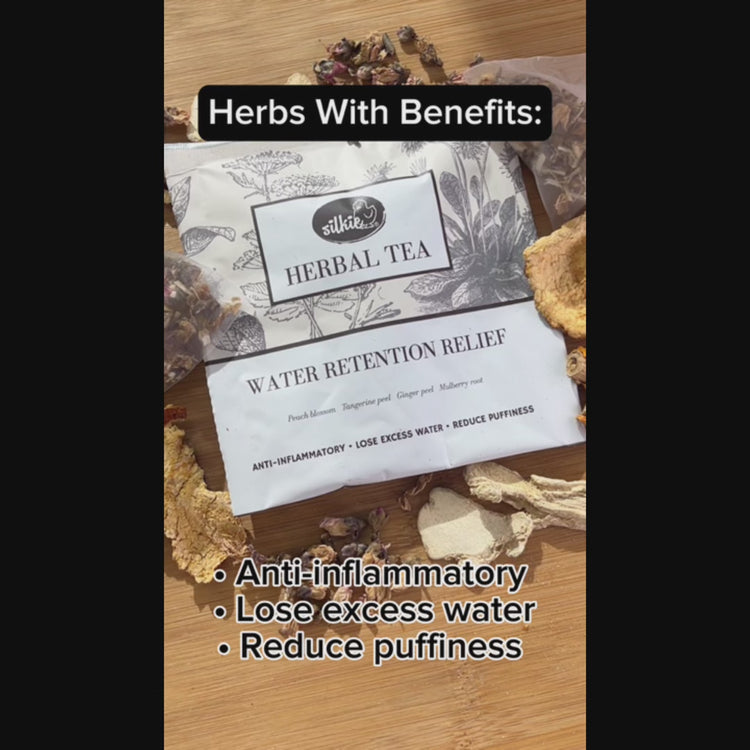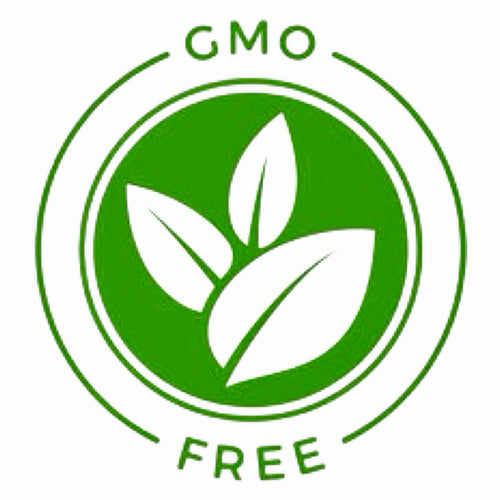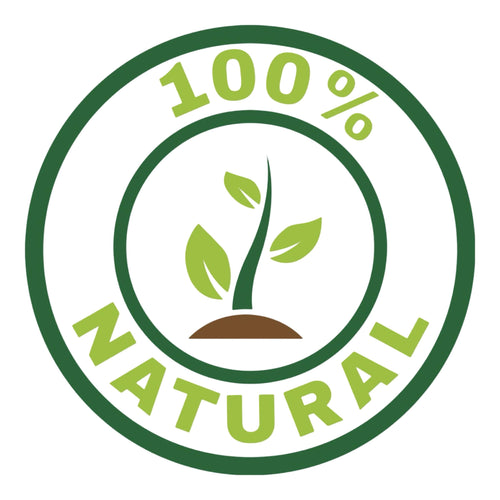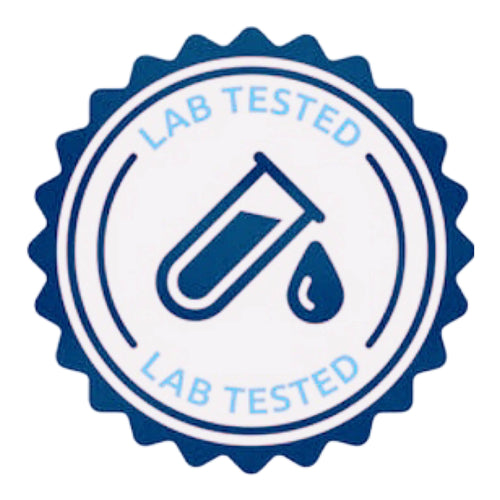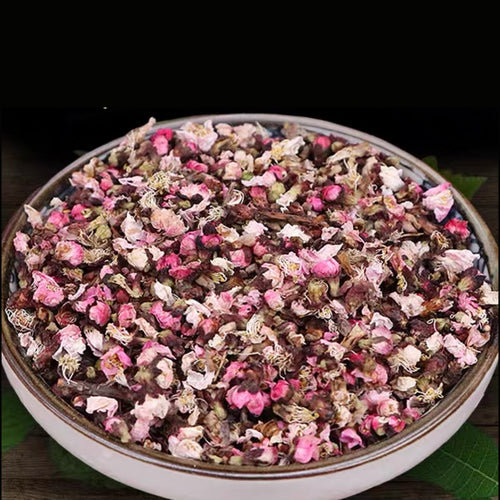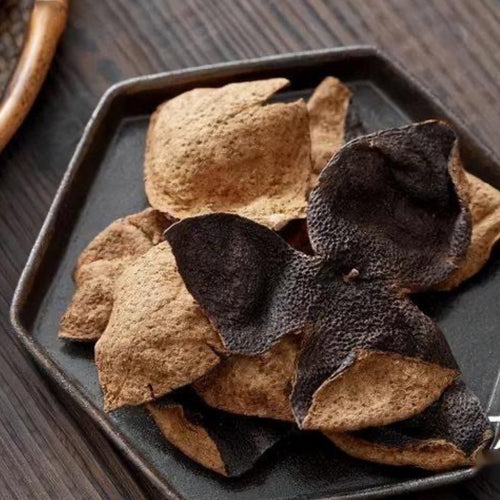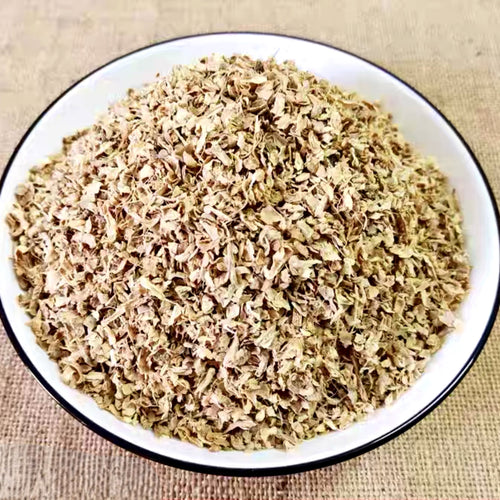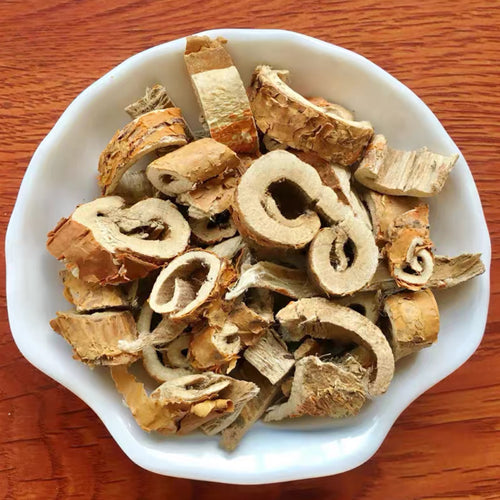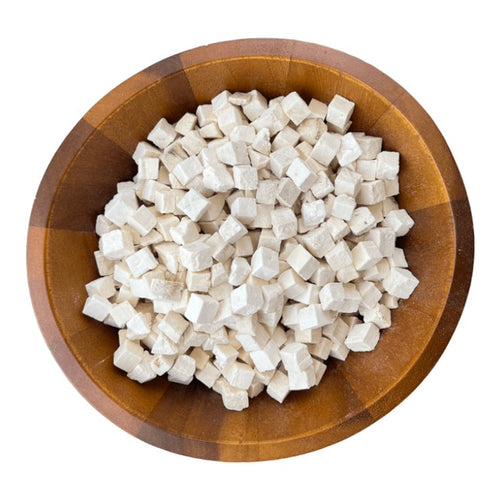This herbal blend, rooted in Traditional Chinese Medicine principles, is thoughtfully crafted to support the healthy drainage of excess fluids and promote internal fluid balance. Featuring a refreshing combination of Peach Blossom (桃花), Tangerine Peel (陳皮), Poria (茯苓), Ginger Peel (姜皮), and White Mulberry Root-Bark (桑白皮), this tea offers a light-bodied experience with floral, citrusy, and gently spicy notes.
Peach Blossom supports water metabolism and helps move stagnant fluids, making it ideal for addressing mild edema or puffiness. Tangerine Peel aids in regulating Qi and resolving dampness, while Poria strengthens the spleen and promotes the elimination of dampness through urination. Ginger Peel adds warmth, supports digestion, and enhances the movement of fluids. White Mulberry Root-Bark clears heat from the lungs and promotes urination, further helping to reduce internal fluid accumulation.
Together, these botanicals work synergistically to support the body's natural ability to drain dampness, reduce swelling, and maintain a light, comfortable internal environment. Ideal as a gentle daily support for fluid metabolism and a balanced system.*
Non-GMO | Gluten-Free | No sugar, corn, or dairy | No artificial colors, flavors, or preservatives
100% Pure natural herbs, blended and packaged in the USA
*These statements have not been evaluated by the Food and Drug Administration. This product is not intended to diagnose, treat, cure, or prevent any disease.
A Proven, Researched-Backed Peach Puff Tea
Studies published in journals such as the Journal of Traditional and Complementary Medicine have highlighted the anti-inflammatory and antioxidant agents, the preventive effect of White Mulberry Root-Bark (Sang Bai Pi) on the development of pancreatitis, showing its reduce inflammation in the pancreas and reduce swelling and fluid accumulation, which can be beneficial for treating water retention. Similarly, research in International Journal of Immunopharmacology and Journal of Ethnopharmacology has demonstrated that Poria (Fu Ling)'s sedative and diuretic activities increased the urinary excretion rate, making it particularly beneficial for those suffering from water retention-related symptoms.
- Anti-Inflammatory*
- Lose Excess Water*
- Reduce Puffiness*
*These statements have not been evaluated by the Food and Drug Administration. This product is not intended to diagnose, treat, cure, or prevent any disease.
Use one tea bag in 8 - 12 oz. of hot water for 10 minutes. Optimal time to drink is between 11 am - 5 pm but enjoy anytime before 7 pm. Do Not Microwave
Peach Blossom
- Anti-aging and analgesic
- Softens the skin
- Relieves pain
- Promotes Blood circulation
- Benefits the Lungs and Liver
Tangerine Peel
- Digestive, anti-nausea, and analgesic
- Supports digestion
- Alleviates nausea and vomiting
- Eases discomfort in the abdomen and chest
- Benefits the Spleen, Stomach, and Lungs
Ginger Peel
- Diuretic and antioxidant
- Promotes urination to reduce swelling
- Alleviates urinary difficulties
- Reduces abdominal bloating
- Relieves abdominal colic
- Benefits the Lung, Stomach, and Spleen
Mulberry Root
- Diuretic and anti-inflammatory
- Promotes urination to reduce swelling
- Reduces pain with urination
- Alleviates labored breathing
- Clears heat from the Lungs and regulates Fluids
Poria
- Anti-inflammatory, anti-cancer, diuretic
- Improves digestion and appetite
- Promotes urination to drain excess fluids
- Calms the mind and eases palpitations
- Benefits the Heart, Spleen, Kidneys, and Lungs
| Supplement Fact Servings Per Container 14 Serving Size 1 tea bag 2.5g |
|
Herbal Blend: Peach Blossom Tangerine Peel Poria Ginger Peel White Mulberry Root-Bark |
Ingredients
Ingredients
 compostable tea bags from plant fiber
compostable tea bags from plant fiber
 herbs harvested at the height of potency
herbs harvested at the height of potency
 tea blend is balance with yin and yang
tea blend is balance with yin and yang
100% Natural
Our teas are packaged in fully compostable tea bags made from plant fiber because we care about the earth and about what you consume.
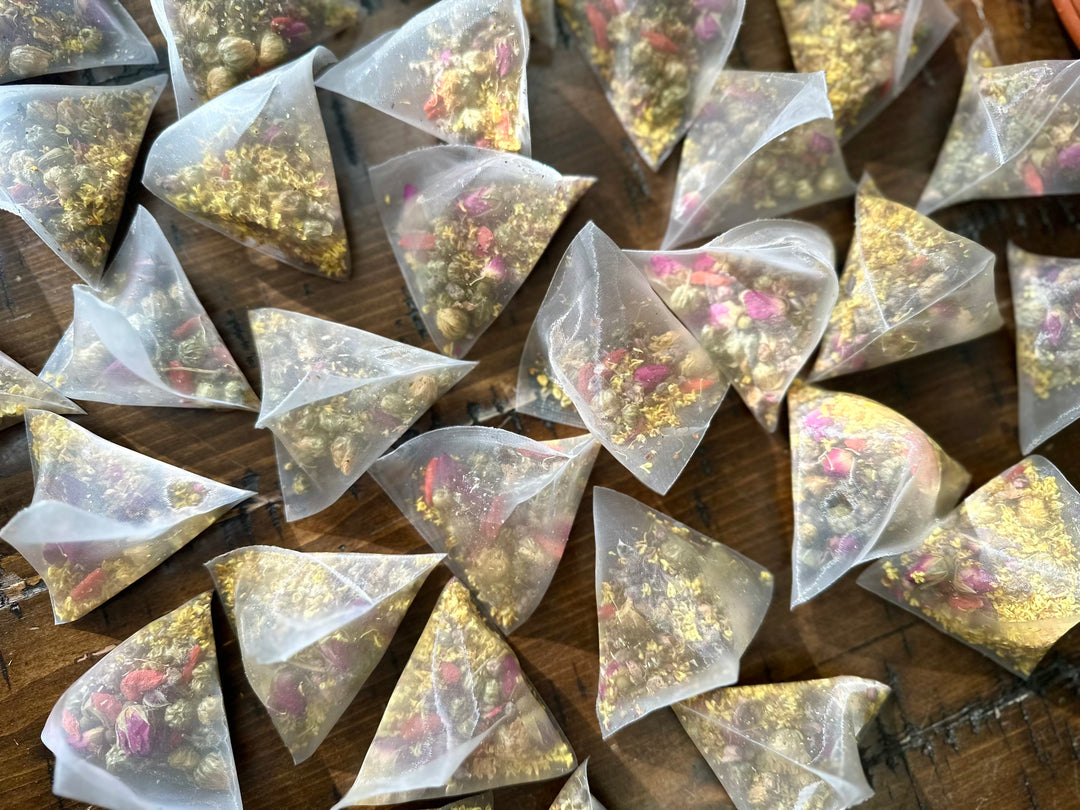
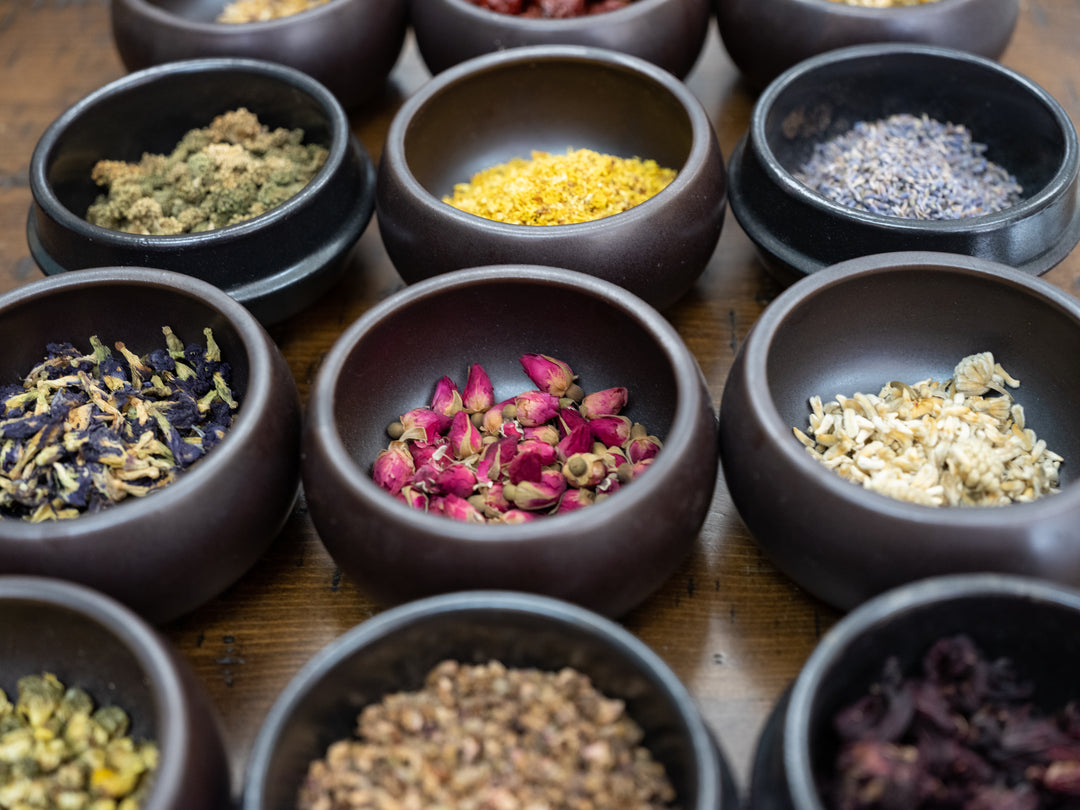
Peak Harvest Herbs
The herbs in our herbal tea blends are harvested at the height of their potency and chosen for synergy to maximize therapeutic effects while maintaining a balance of delectably unique flavors. To us, sharing a good cup of herbal tea is extending a moment of healing comfort in our busy world.
5 Generations
Over five generations we have collected, tested and refined Chinese herbal formulas that themselves draw from 3000 years of experience of Traditional Chinese Medicine. Traditional Chinese Medicine is a profound pathway to create the life you were born to live. It's a timeless bridge that can initiate and support change and growth in any and every life dimension: physical, mental, emotional, and spiritual.
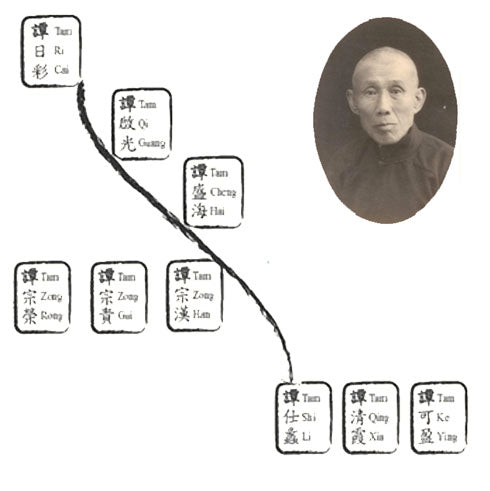
Message From Ann
“Good Health is crucial for our overall well-being. It encompasses physical, mental, and emotional aspects, and it's important to prioritize taking care of ourselves to lead a fulfilling life. Emphasizing prevention over cure is paramount for maintaining this balance. Without health, life can become incredibly challenging. It affects our ability to pursue our goals, enjoy our relationships, and experience daily life to the fullest. Good health forms the foundation for everything else we want to achieve and experience.” - Ann Tam
Click below for
Ann's Story
Here's my story.
If you feel skeptical or unsure of Chinese herbal remedies, I could hardly blame you. I wasn't a believer either until my daughter grew very sick and my father (the 4th generation herbalist) helped her get better with herbs.
I was born into a family of herbalists. My father, my grandfather, my great-grandfather, great-great grandfather were all herbalists. I represent the 5th generation in this long lineage dating back to Imperial China.
When I was three or four years old, I started to learn herbal songs and how to identify herbs. As I got older, I was taught how to process the herbs while working in my dad’s clinic in Vietnam. After we immigrated to the United States, my dad asked me if I wanted to pursue a career in TCM as an herbalist or acupuncturist. I said, “No, just leave me alone, Dad. I will find something I enjoy doing for work.” So, he left me alone to find my own way.
I wanted nothing to do with herbal medicine until I gave birth to my second daughter, Catherine, who was born with severe gastric reflux. When Catherine was 10 days old, I had to take her to the ER for IV injections into her little hand because she couldn’t keep milk down. Besides vomiting, she also was having diarrhea. Catherine was losing nutrition from both ends, so her tiny body was shrinking. At that time my dad warned me, “She needs to be treated with herbal medicine, otherwise she will have seizures later on.” I didn’t fully understand what my dad was talking about, so I ignored him.
My daughter got so ill that she could only take half an ounce of milk per hour. Before feeding her, I would use a syringe and shoot Zantac into her mouth to lessen the vomiting. As time passed, she needed milk more often, and consequently more Zantac. By the time Catherine was 8 months old, she needed to be fed and medicated 11 times a day.
I could hardly sleep, eat, shower or rest. Even at night, I had to drape my daughter over my shoulder for her to sleep. If I put Catherine down, she would vomit. I barely had time to squeeze in a 5-minute shower once or twice a week for myself. I was exhausted, but what could I do? I had to care for my daughter and do my best to survive each day with the hope that she would get better or at the very least her condition would not worsen.
Catherine had to wear a turtleneck with two sweaters along with a baby cap and scarf to be outside during the heat of summer, even when temperatures were 100 plus degrees. If I didn’t cover her up, she would have a runny nose, cough, and non stop vomiting. How will she be able to go to school or anywhere with air conditioning?
One day we went to a Vietnamese pho restaurant. After I set Catherine down into the high-chair, I turned around and adjusted my chair. Then I heard a woman’s shout, “Look at her!” I looked in the direction she pointed. It was Catherine…her eyes rolled up and her entire body stiff and shaking with fluid coming out of her mouth. Someone said, “Squeeze some lemon into her mouth.” I did it without hesitating and Catherine’s body relaxed.
We rushed her to the ER. For 3 days she was in the NICU where they monitored her brain. The doctors told me I was lucky because my daughter’s seizure didn’t last for more than 3 minutes which would have damaged her brain. After that I always carried a piece of lemon because I had no idea when my baby girl might have another seizure.
The seizures started to come weekly, so the doctor prescribed anti-seizure medication. Catherine wasn’t even 1 year of age, and already she was taking Zantac 11 times plus anti-seizure medicine 3 times a day. It was nearly impossible to administer the anti-seizure medicine because whenever I took out the syringe, she would cry and start vomiting.
I took Catherine to see a specialist at CHOC. I asked, “Doctor, have you ever seen any infant with this condition get well?” The doctor replied, “It depends. Some will grow out of it, but some don’t. If they don’t, then they will have to take medication for the rest of their life.”
“What do you mean by grow out of it?” The doctor explained that Catherine might get better by herself as she got older.
My mind was racing. “All this time the prescribed medication has not been treating her stomach?” The doctor said, “No, it only helps to guide the food down, so she won’t vomit it back up. That’s why you have to give it to her before the feeding.”
“Well, what if she doesn’t grow out of it?” In that case, Catherine will be dependent upon medication for the rest of her life. The doctor further informed me that she too was born with gastro reflux and is still taking medicine for the condition.
Her statement was like lightning in my brain. If the doctor can’t even treat herself for gastro reflux, how can she help my daughter? Seeing the futility of my path, I turned to my dad for help.
My dad advised me to stop all western drugs and to give her an herbal prescription 3 times a day. Administering medicine 3 times instead of 14 times a day to Catherine was a godsend to me. Even though it sounded too good to be true, I figured that I could still give Zantac to Catherine if she didn’t get better or continued to vomit.
After one month of herbs 3 times a day, Catherine vomited less and less. To test Catherine, I let her cry to see if she would vomit. She didn’t, so I knew she was getting better. After another month of herbal medicine, Catherine was able to wear less clothing without getting a runny nose, coughing, or vomiting. After 3 months of herbal formulas, she stopped having episodes of gastro reflux and seizure. Catherine will enjoy a normal, healthy life.
Because of Catherine’s dramatic recovery, I was sold on Chinese medicine and asked my dad to treat me. I fainted very easily, especially during the winter. After a few months of herbal formulas, I have never fainted again.
I started to have time to think and tried to understand why a piece of lemon helps to relax the muscles and stop a seizure. Lemon is a common citrus, yet it has magical powers that we don’t understand and underestimate. I wanted to learn more and find answers, so I decided to go to China which has a long history of herbal medicine. I went to TCM schools in China and Hong Kong and worked in the TCM hospitals to learn from the best herbal doctors in the world.
When I was there, I knew one day I would want to become an herbalist, but how can I get a steady supply of high-quality herbs. My dad and I backpacked across China and visited many farmlands. We interviewed farmers to grow herbs for us. Our products are used with the highest quality herbs that have been harvested at the height of their potency. They are substantially more expensive than less potent herbs that were harvested in the pre- or post-season.
After I came back to the United State, I worked with my dad and learned from his experiences and studied the formulas that our ancestors passed down. What I have been through helped me to understand the importance of health. Without health, don’t even talk about career, beauty, education, freedom, etc. I now have worked with many families who have suffered as I have. Their endearing appreciation drives me to work harder.
Our namesake "Silkie" is a Chinese breed of chicken that is well known for its calm and friendly temperament. They are gentle and caring and make wonderful mothers. A Silkie loves nothing more than brooding a cluster of eggs, whether they are hers or not, even if they are "duck eggs". We share the same outlook and care for our clients the same way we care for our own family.
